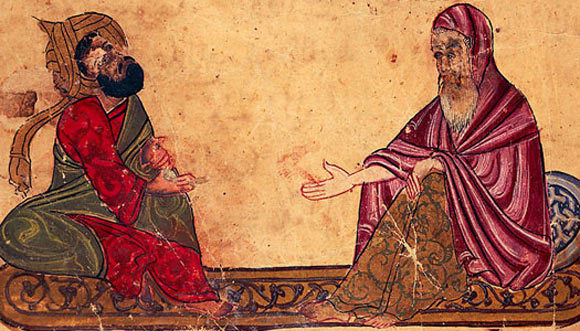Al-Kindi invented “Cryptanalysis” and “Frequency analysis”
Al-Kindi was an Arab Muslim philosopher born and brought up in Iraq in 801 CE. His fields of interest were very diverse, including mathematics, physics, metaphysics, music, ethics, logic, psychology, philosophy, medicine, pharmacology, chemistry, astronomy, astrology and optics. Iraq was the centre of learning of the Arab world at the time, so Al-Kindi received the best possible education he could have gotten. Both his father and grandfather had served as the governors of the city of Kufa where he was born. He was a descendant of the Royal Kindah tribe, which gives him his title of “Al-Kindi”. The Kindah tribe was a union of several different tribes and had once been very prominent and important in Arabia.
After receiving his basic education in Kufa, Al-Kindi moved to the city of Baghdad to pursue further learning. He was a knowledgeable scholar, which won him a good reputation in the eyes of Caliph al-Ma’mun. The caliph was at that time engaged in setting up “The House of Wisdom” or “Bayt Al-Hikma” which was a centre for learning where reputed scholars worked on their books, treatises and research. It was here that Al-Kindi was employed by Caliph al-Ma’mun and where his initial task was to translate Greek scientific manuscripts. Al-Kindi was very much impressed with the work of the ancient Greek philosophers and scientists, particularly Aristotle and to some degree Plato, Porphyry and Proclus. By some accounts, Al-Kindi was not well versed enough in Greek to do the translations on his own, so he added his own commentary and thoughts to existing works and thus made a collection of volumes with his own ideas.
After the death of the caliph, his brother al-Mu’tasim became the new caliph and he also treated Al-Kindi with favor. During al-Mu’tasim’s reign, Al-Kindi was appointed as the royal tutor for his son. After al-Mu’tasim’s death, however, came al-Wathiq, and then al-Mutawakkil, and they had no regard for Al-Kindi or his accomplishments. In fact, it is said that they had him beaten and confiscated his library. His list of works was very comprehensive, as Al-Kindi was a master of many fields of thought. His most significant work is titled “On First Philosophy” which talks about the oneness of God, the nature of existence and the concept of eternity.
Al-Kindi also wrote important works on psychology, including “That There are Incorporeal Substances” and “Discourse on the Soul”. In these books, he talks about the immaterial nature of the human soul, drawing concepts from Aristotelian philosophy. In the field of Epistemology, his most famous book is called “On the Intellect” in which he discusses the nature of human intellect and the human potential for learning and discovering. Al-Kindi also made important contributions to the field of mathematics. He applied mathematics to other fields such as optics by drawing geometrical diagrams to explain light rays and the concept of reflection, refraction, shadows etc. His ideas on vision influenced the work of Ibn al-Haytham who was the first to give an accurate explanation of vision, a few decades after Al-Kindi. According to the famous bibliographer Ibn Al-Nadim, Al-Kindi wrote over 260 books, including 32 books on geometry, 22 books each on medicine and philosophy, 9 books on logic and 12 books on physics. He also wrote many notable books on astronomy in which he discussed the nature and position of the planets and heavenly bodies in the solar system. After his death, his work sadly fell into insignificance and was overshadowed by later philosophers. However, the extent of his knowledge and ideas remains unparalleled and he is a respected scholar and philosopher till today.
